Negima!?: Series 2 - Part 2
Introduction
Negima!? has been hit by the occasional delay, but for once, we reviewers are pretty much immune. Not too long after finishing the first review, the concluding half of Negima!? arrived, and has since lain at the bottom of a review pile working its way slowly upwards. Still, who cares about delays when you are getting the whole series in two sizeable chunks, just a couple of months apart? What you really need to know about Negima!? is that it is the second anime adaptation of Ken Akamatsu's comedy, featuring a ten-year-old wizard teaching a classroom of 14-year-old girls. As you would expect from Ken Akamatsu, fan service abounds. However, this second series is mostly unrelated to the first, re-invents the story and the characters to a degree, and is animated by a completely different company. You don't need to have seen the first series to enjoy this one, indeed it tells a completely different story.
Negi Springfield is the newest member of the faculty at the Mahora Academy. It's a girls' school the size of a small city, and would be a daunting prospect for anyone, but Negi is actually a child prodigy, a college graduate at only ten years old. He can't even reach the blackboard, yet he has to teach English to a class of fourteen-year-old girls. Hailing from Wales, Negi has a secret to protect, he's actually a wizard, and his final challenge before gaining the rank of Magister Magi, is to teach at the Japanese school. However, under no circumstances must anyone find out who he really is, or he will be recalled back to Wales, stripped of his qualifications, and worse, turned into a small animal. At the same time, he has to deal with blood-sucking vampires, rogue robots, magical forces of darkness, trying to find out what happened to his father the legendary Thousand Master, and a perverted ermine named Albert Chamomile who is trying to get him to lock lips with every girl in his class.
This series has seen Mahora Academy plagued by an encroaching darkness, and Negi having to be discreet with his wizardry as he attempts to fight it and protect the school. The problem is that his students keep getting sucked into illusory worlds, and as he rescues them, they keep learning his secret, not good when there are a couple of representatives of the Magic School keeping an eye on him, and only remedied when he hastily forms a pactio (kiss in a magical circle) with the girl in question, to create a magical partnership. Then there is the mysterious Black Rose Baron, who keeps appearing, saying something mysterious, and then disappearing again. At the end of the previous set, the secret was well and truly out, and as a punishment, Negi was turned into a chupacabra (don't ask). But before they knew it, the whole class was sucked into an illusory world, and Negi without his powers!
The final thirteen episodes of Negima!? are presented here across two discs courtesy of Manga Entertainment. And the episode titles are still taking the mick.
Disc 1
14. Frankly speaking, in the face of magic, scientific theory might as well be nonexistent.
The fairy was defeated and turned into a crystal, but the illusory world did not vanish. And then Asuna was an idiot and opened the wrong door. Suddenly everyone is being attacked by the darkness again, and with Takahata injured, it's all they can do to keep running. Then Chamo has an idea of how to return Negi to normal (and make a bundle in the process), except before they can carry out their plan, Negi gets kidnapped, and a bunch of schoolgirls need convincing that kissing a ten-year-old school teacher is a good idea.
15. The class is growing disquiet at the unexpected turn of events. So they're getting louder? 15 points.
The class has escaped the illusory world and are back at Mahora Academy, except it's not the right one. This Mahora Academy is rundown, ruined, abandoned, overgrown, and surrounded by weird critters. Negi's got a whole class full of magical partners to choose from to figure out what's happening, and it quickly becomes apparent that they are still in an illusory world. The girls split up into an Exploration Team to look around, a Research Team, to understand the crystals and figure a way out, and a Domestic Team, because someone has to cook and clean. Meanwhile, Negi's feeling guilty.
16.Yesterday's foe is today's friend. Good enough friends to have fights. No doesn't always mean no.
The girls are settling down in the illusory Mahora, but some are more impatient to get back to the real world than others. When Ayaka insists on taking a tea break with Negi, it rubs Asuna the wrong way, who is determined to keep looking for a way out. Soon Asuna and Ayaka are engaged in a bitter duel, with poor Negi in the middle. Then, as the two girls face their toughest test, the darkness reappears.
17. Natsumi, family will always be the home run king of bonds. Don't you agree? I don't understand what you mean at all, Chizuru.
Asuna and Konoka are in the mood for a late night bath, but they find someone there ahead of them, partaking of the ablutions. A blonde haired stranger turns out to be Negi's sister Nekane, although she has a tough time coming up with a reason why she suddenly appeared in the bath. Negi is delighted to see her, but some of the girls think she is behaving oddly. While Konoka and Setsuna investigate further, and follow Nekane around the school, Asuna has a new obsession, catching the giant magical bonge bonge beast wandering the school grounds. When the darkness reappears and tries to suck Ako in, Nekane disappears, and the Black Rose Baron appears to save the day… Could it be?
18. There's a bastard who gets all happy with secrets, then reveals them, and it really p***es me off. Chiu-Chiu is going to get angry too! Really mad!
Negi has to deal with his sister Nekane's secret, but it's not much of a secret when everyone knows. The thing is that Nekane must have a reason why she is behaving in such a manner, and it's obvious that she can't just come out and tell Negi why. Negi and the girls decide to humour her, and let her tell them in her own time. Except they haven't counted on Asuna, who appears to be aiming to confront Nekane straight to her face. It's time to distract Asuna, revive some of her earlier obsessions with Takahata or with the chupacabras.
19. It's great to go back to being a kid again and having fun. Although, I can have fun without going back to being a kid, too.
Negi's trying to bring some structure into their lives in this illusory Mahora, and has started teaching classes again, much to the annoyance of Asuna, who would rather spend time trying to escape. So much for a return to normality though, as there is a surge of magical energy, and it's suddenly like Negi has drawn all the dud cards from his pactio partners. Yes, all the girls in class have been transformed into cute little mascot animals, and Negi finds he has to take care of a horde of cute infants.
20. They say, bigger the blander, but that's not necessarily true in actuality.
Following the previous toddler misadventures, Takahata realises that the magical world is becoming unstable, and the darkness is encroaching. His attention turns to creating the perfect ramen, just when he's needed for serious work, as all of a sudden, Evangeline is turned into a hundred foot giantess. Fortunately she doesn't go on the rampage. Unfortunately, she decides to take a nap on the school roof, and the building starts to collapse.
Disc 2
21. A man silently eats his Ramen Takamichi. What the hell does that even mean?
Yue has trouble, she's fallen for Negi without realising it, and now she has to deal with feelings she just doesn't have time for, as well as the stress it's causing for her friendship with Nodoka. It's nothing compared to the trouble that Evangeline has. Her cottage is suddenly adrift in the middle of the ocean, her magic is drained after her outing as a giantess, and in the middle of nowhere, it's hard for Chachamaru to recharge.
22. Aiya! Something strange is beginning to happen! This must surely be the end of the world!
Takamichi's noodle restaurant is causing havoc, but there is a point to this distraction. With some traditional cookery magic, he may just discover who is behind all this. Meanwhile, Chizuru and the other research girls have made a breakthrough in figuring out why certain girls have been possessed by the darkness. It all boils down to astrology. That combined with the familiar locales that Negi has been trapped in, really means that only one person can be responsible, and it explains just why his sister Nekane has been so secretive. The final piece of the crystal falls into place, and suddenly Evangeline appears, possessed by the darkness, and speaking with the voice of Negi's childhood friend.
23. Wait, you can't do that, Negi! That's right because we're your partners!
Anya has taken possession of Eva's body, and is using it to inflict her magic on all of Negi's friends. She means to make him feel as lonely and miserable as she has felt since he left for Japan. But Anya's in trouble too, ensnared by the Star Crystal, and forced to do its bidding. With the Star Crystal's powers, she's practically omnipotent. And it's all Negi can do to tell his students to run and hide, but you can't keep good friends down.
24. Professor Negi, it appears this is the climax. Let's all go home together, Negi.
Negi's been sucked into the Star Crystal, and he finds himself in… the opening sequence?! Indeed, the world is full of school desks, and all his students are there, with convenient numbers helping him keep track of who is who. It's a trap of course, and unless he and Anya can escape the clutches of the Star Crystal, they'll be lost inside a magical black hole forever.
25. And with that, the case is closed!
The class is settling back into the real world, and slowly getting back to normal everyday life. That means a party of course, and the girls of 3-A are hard at work arranging a bash to celebrate their return. All except Anya, who is being moody and spending time by herself. Worried that she may be depressed and feeling guilty over the Star Crystal incident, Negi decides to follow her, and Asuna, Konoka and Setsuna tag along.
26. I will not say that I'm lonely! Because, I have faith that we will surely meet again!
Negi senses that his father, the 'Thousand Master' is nearby, and he's determined to find him. Everyone offers to help him, and it's time for a mass pactio transformation. We also learn just why Makie calls Motsu the frog, father.
Picture
The immediate difference is the aspect ratio. The first Negima! series from XEBEC was 4:3, but the OVAs and this second series from SHAFT are in 1.78:1 anamorphic. If you've seen Moonphase, you'll be familiar with the animation style, which is imaginative and varied. Expect plenty of odd angles, curious camera placements, and plenty of sight gags going on in the background. Split screen is used with impunity, and the plethora of styles can make it a chore to watch at times. Watch out for Asuna's hair, which is prehensile in this version of the show, and a useful indicator of her state of mind. You'll be using the pause button quite often for the on screen captions that translate little snippets of writing on black boards, placards and the like. It's a practical in-joke minefield. The animation is of high quality, vibrant, expressive and fluid, and you can see the effects of a higher budget, but I do find the character designs are a tad flatter than in the first series. As you would expect, the transfer is an NTSC-PAL standards conversion, but it's a pretty good one. Pans and scrolls are relatively smooth, the image is well defined and not prone to excessive softness. It's a pleasant enough viewing experience.
Except for the compression artefacts. It would be easy to put the blame on episode count per disc, but I've seen the same on anime discs of just four episodes. The problem is fast and frenetic motion. When there is a lot happening on-screen, and there is a high frame rate, animated lines and edges tend to break up, resulting in pixellation and mosquito noise. It's most prevalent here during the opening credits, taking place in a stage filled with countless CGI school desks and fast camera movement. It does crop up during the show as well on occasion, and in that respect this isn't the most robust of transfers. It is still watchable though. Oddly enough, the digitally streamed episodes suffered from exactly the same issue, making me wonder if it isn't a problem with the source material.
Sound
Just as in the first series from Revelation, you have a choice of DD 2.0 English and Japanese, with optional translated subtitles or a signs only track. As always my first choice is for the original language, and I found nothing to complain about. The dialogue is clear, the subtitles legible, and the music suits the show well, with a couple of toe-tapping tunes accompanying the credits, unwisely re-recorded in English for the dub version. Once again, the arrangement of the opening theme and this time the closing theme, changes every few episodes. There are subtle differences in the credit sequence animations as well to reflect this. As with a fair number of series, the Japanese voice artists also sing the theme tune, and with a cast as extensive as Negima's, it's the only way to get them all involved.
One of the selling points of this second Negima series is that they have managed to retain both the English and Japanese language casts from the first series. Simple enough for Funimation who dubbed both series, harder in Japan, where the production companies changed, and it is such a large cast. I'm very happy with the Japanese version, there are a couple of quirky and memorable characters, particularly Konoka and Kaede, whose voice actor performances I adore. I'm not too keen on the English dub though, and it seems that despite the cast continuity, it sounds harder on the ears, with the incongruity of thirty-something voice actresses providing voices for fourteen year old girls all too apparent. And Greg Ayres still sounds like Negi Van Dyke.
Extras
A simple static menu with the theme tune playing, a jacket picture for when the disc isn't spinning, it's all par for the course for your average anime discs.
When each episode ends, you get a little skit with some of the characters, whether it's a Baka Rangers mini-animation, some Chupacabra silliness, South Park, or a visit to Eva's tearoom.
Disc 1 gets the audio commentary, this time to go with episode 19. Luci Christian (Asuna), Chris Cason (Chamo), and Trina Nishimura (Lingshen, Motsu) get together to giggle, gossip, natter, and goof around. I've heard a lot of Funimation commentary tracks, and I'm used to the mayhem that is unleashed in most of the sessions. Even in comparison to the worst of those, this one is a total waste of disc space, with nothing of substance to be gained from the first half. I don't know about the second half as I turned it off.
The rest of the extras are on disc 2, with the same textless end sequences as the previous volume repeated here. With all the varieties of opening sequence animation coupled with the various recordings of opening theme, as well as the other iterations of closing sequence, you would have expected something different than before.
The Notes From The Classroom return, offering more text translations for those bits that we missed out on in the episodes proper. There are 44 pages this time around.
Finally, in Go Mahora Rangers! we get a chance to match the faces of the English voice actors to the characters they played, in a 90 second slideshow sequence.
Conclusion
We come to the 'ditto' part of the review, the part where I state that if you enjoyed the first half of Negima!?, then you should have no qualms about investing in the second half, as it offers you more of the same. There's something of a comfort level in that, knowing that if you fell in love with the cute story, the offbeat sense of humour, and the wall to wall visual gagfest, that you won't be hard done by in the second half, and the animators haven't spun off on a random tangent at the last minute. It does become clear to me with this second half, that Negima!?'s story is thin, very thin indeed, something that could conceivably be resolved in a single episode or two, and a person of a certain mindset could say that it's just padded out with the random gags and odd diversions. Of course the gags are the whole point of the show, and if you've actually come to Negima!? expecting narrative depth, then you've taken a wrong turn at Albuquerque.
If I did have one issue with the first half of the show, it was the Pokemon-esque collect-a-girl thread of the storyline. Negi would try to keep his wizardry secret, only to be found out by one of his students, forcing him to enter into a Pactio partnership with her to keep his secret hidden. As the episodes went on, he slowly gathered a harem of schoolgirls, and each Pactio would gift him with a new set of cards signifying his new partner's abilities. The secret was out at the end of the previous volume, and the first episode in this set gets all of the pactio partnerships out of the way, in perhaps my favourite sequence of the series, calling back to the Happy Material theme song from the first show. Of course the collectable cards keep making an appearance whenever a partnership is invoked, but there is no more sneaking around, puckering up with a student, one by one.
That done and over with, it's all focus on the main story and indeed, trapped as they are in an illusory world, they have nothing to do but to figure out what's behind the darkness that's keeping them there, and how to deal with their unknown foe. Or so you would think. The main storyline does tick over, and the darkness does pop up repeatedly, attack a stray student, and require a magical vanquishing from Negi and his charged up partners, but by and large the episodes are devoted to having fun, little slapstick asides, and copious wordplay. Unlike the first series, all of the students get a look in, with plenty of little character moments to highlight their respective quirks. The Black Rose Baron question is solved early on, Negi's sister Nekane enters the story, Asuna and Ayaka have an argument in one episode, the class all turn into childish mascot animals in another, and there are plenty more shenanigans to appreciate.
Things get a little more serious as the series closes out, and dare I say it, even a little emotional as the reason behind the darkness is revealed, and it turns out to be Negi's childhood friend Anya. The story concludes in suitably dramatic fashion, but even at the most cliffhanger moments, the show refuses to remove its tongue entirely from its cheek, cutting away to see Asuna rowing with Evangeline before bringing us back to the action. I've already mentioned that this show is animated by SHAFT, who brought us Moonphase, and it shows in this set, in more than just the animation as well. Earlier on, a burst of magic sets Evangeline's cottage adrift in the middle of the ocean, in a storyline very similar to one of the Moonphase bonus episodes.
Speaking of bonus episodes, the Negima!? story too concludes with twenty-four episodes, and the final two can be seen as bonus stories for additional value. The difference is that they actually continue the storyline rather than venturing into completely surreal territory. The first is truly an epilogue, and we get to know Anya's character better, as we see her come to terms with what happened with the Star Crystal, and we see if class 3-A can come to welcome her after what she did to them. The final episode is more of a treat, as Negi's search for his father takes centre stage. The Thousand Master vanished from Negi's life years previously, and his career in wizardry was motivated in part by a need to find his father, as well as by a need to surpass him. This episode is as close as he has gotten on screen so far.
The animation is quirky, surreal and brilliantly accomplished, the story, thin as it is, is better and more interesting, and the comedy is solid, fast paced and wonderfully charming. I guess I'm just perverse in preferring the first series, which is inferior in all these aspects. If you like the Ken Akamatsu, Love Hina type harem antics, stick with the first series. If you actually want depth, dimension, and better entertainment value, then this second series is ideal. It's quirky, mirthful, and consistently entertaining. It's a delightful little series that should be high on your list if you like a little offbeat anime comedy.
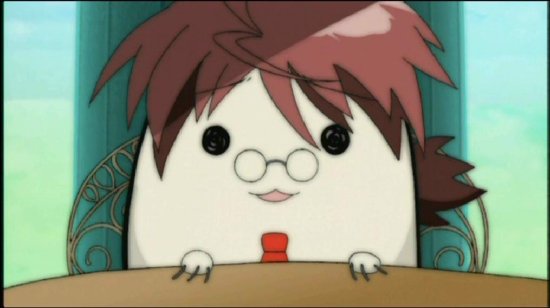
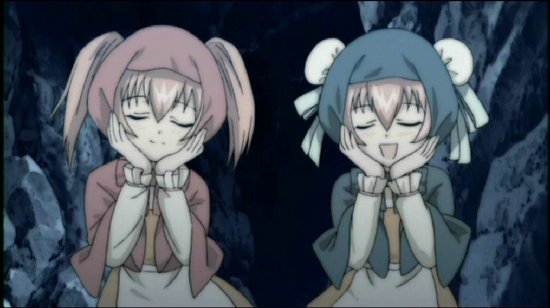
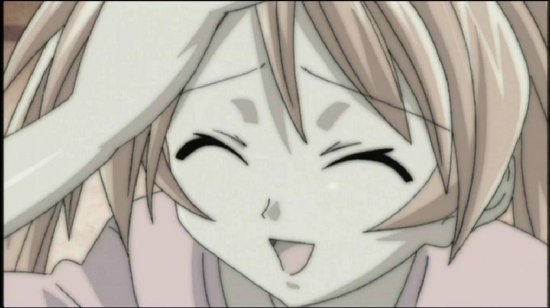
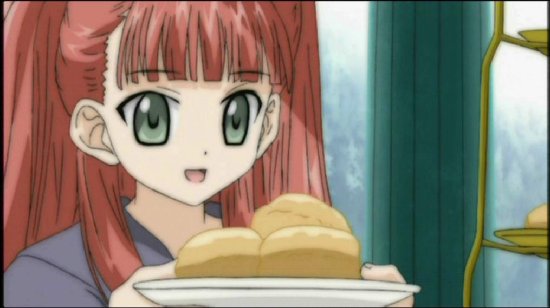
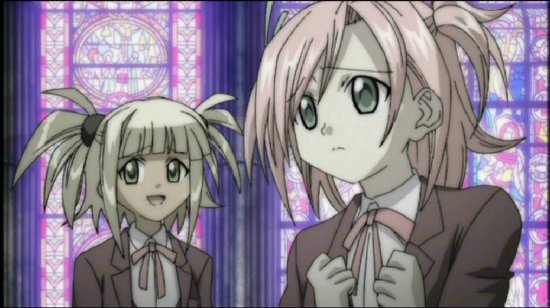
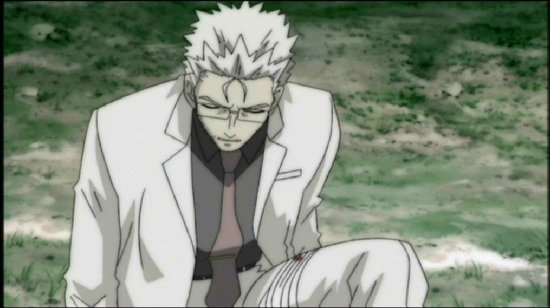
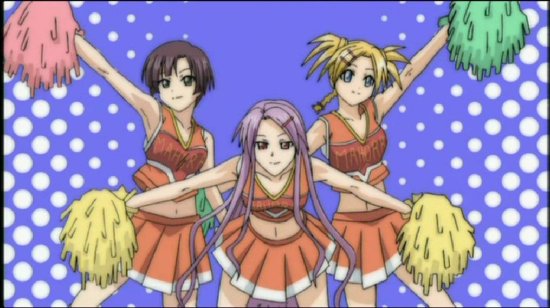
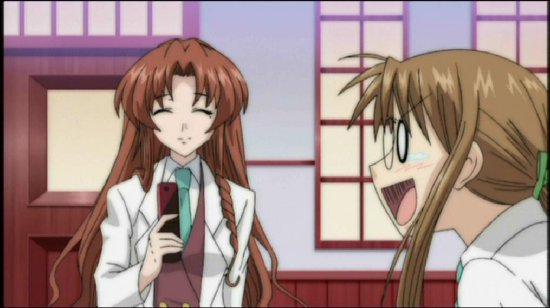
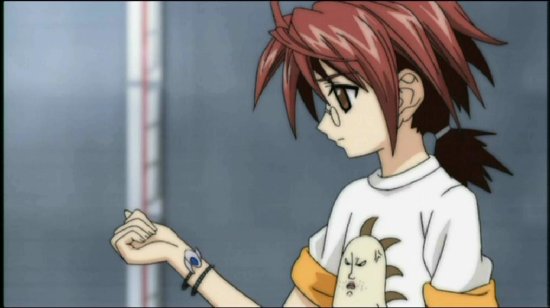
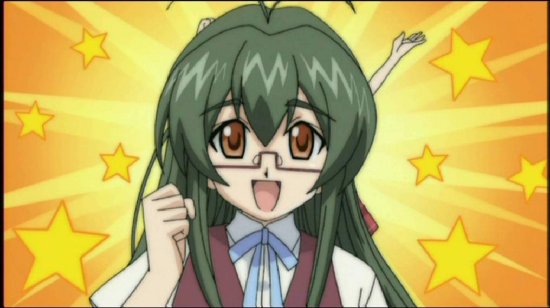
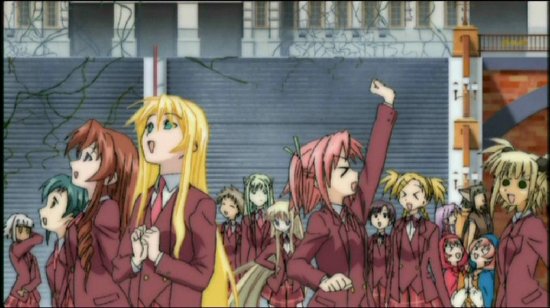
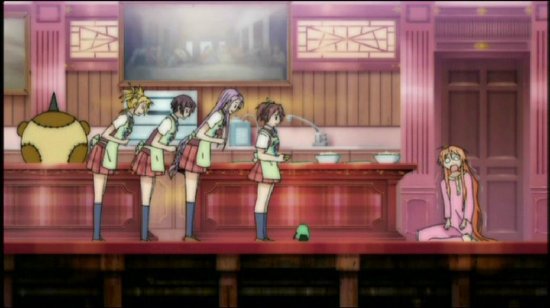
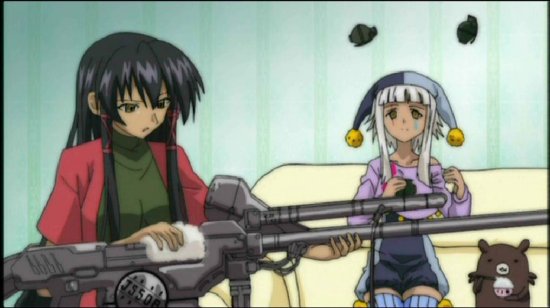
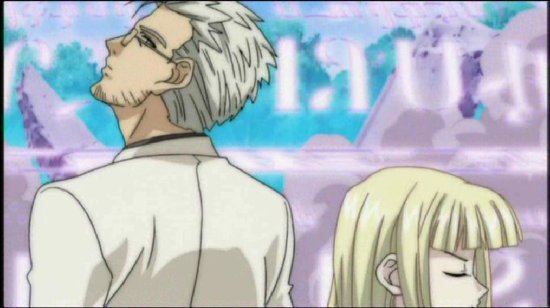
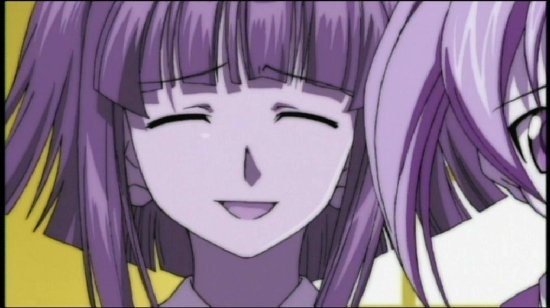
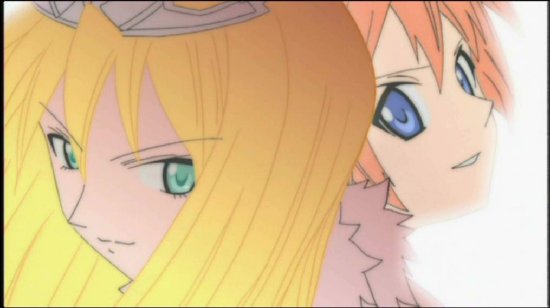
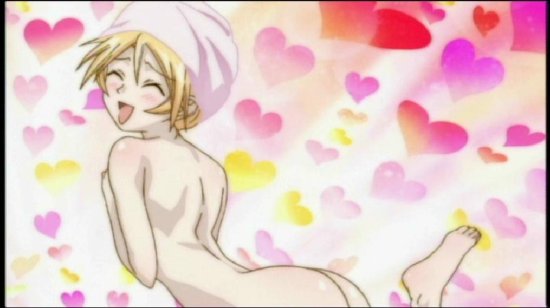
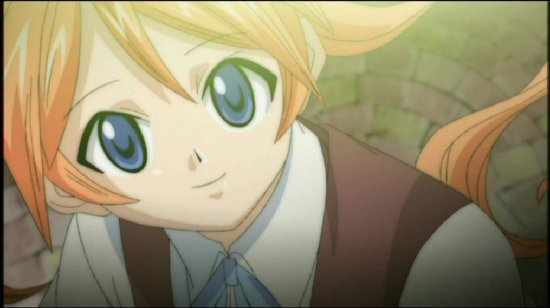
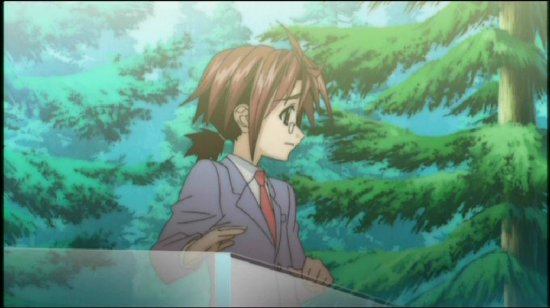
Your Opinions and Comments
Be the first to post a comment!